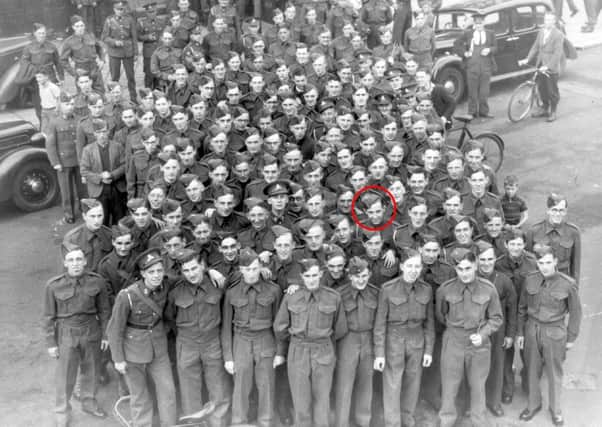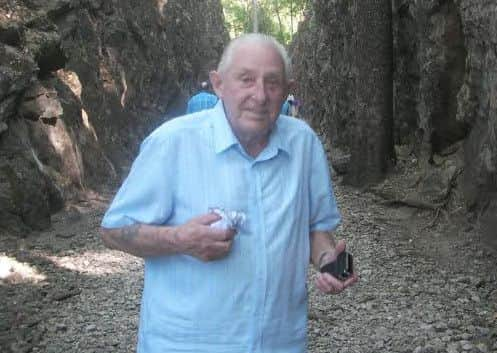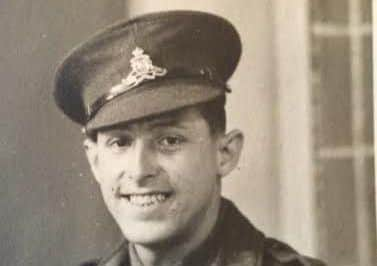Last salute for hero of the Death Railway


Harry Motteram, 94, was made to work on the infamous Burma Railway, dubbed the Death Railway, after being captured by the Japanese and held as a prisoner of war for three-and-a-half years.
The bridge over the River Kwai, on which he worked, was part of 250 miles of track built in Thailand, by 250,000 labourers – more than 100,000 of which died.
Advertisement
Hide AdAdvertisement
Hide AdMr Motteram, who was married to wife Eileen, 84, died on May 1 after a battle with cancer.


Mr Motteram’s family as well as The Royal Artillery Association told The Gazette they believe he is the last member of the 137th Field Regiment – also known as the Blackpool Regiment – which had its headquarters based in the resort after forming in 1939.
Harry’s daughter, Diane Seville, said: “He never really wanted to speak about what happened. I just think at times he wanted to blot it out.
“Dad arrived in Singapore in December 1941. At first they all thought it was a bit of a holiday as there was no hint of the war where they were. As a driver dad’s main duties were transporting officers to and from a hotel.
Advertisement
Hide AdAdvertisement
Hide Ad“Of course it was a different story when the Japanese invaded. Dad told stories of utter chaos – they were not at all prepared for the invasion.


“After the surrender, dad was in Changi Prison until June 1942. He was among the first to go to Thailand.
“They were told they were going to build a hospital and that conditions would be much better than they were in Singapore.
“The truth was the exact opposite. They were packed so tightly into cattle trucks that they could only stand. Dysentery was rife so it can only be imagined what the conditions in the trucks were like.
Advertisement
Hide AdAdvertisement
Hide Ad“It was at this point that dad was separated from the rest of the regiment. From what I could gather he spent some time on the railway transporting water from camp to camp but he also related tales of how they built bridges and then sabotaged them with termites so they collapsed as soon as the Japanese tried to use them.
“He also worked on the railway and experienced the hell that was Hellfire Pass, noted for the harsh conditions and heavy loss of life suffered by its labourers.”
Mr Motteram married wife Eileen in 1965 and moved to Sherbourne Road in North Shore in 1986.
The great-great grandfather had enlisted in 1939.
He survived horrific conditions to return to the UK, but missed a civic reception for the Blackpool Regiment by six weeks after becoming separated from his fellow troops at Changi Prison.
Advertisement
Hide AdAdvertisement
Hide AdMr Motteram went on to work as a plumber – a role he continued until he was 86.
He returned to Thailand in 2009 with Diane and the pair visited the railway he helped to build.
But after being diagnosed with bowel cancer, he died at Trinity Hospice in Bispham on May 1.
Paul Evans, librarian at the Royal Artillery Association said: “It is more than likely he is the last member.”
Advertisement
Hide AdAdvertisement
Hide AdSpeaking of the conditions her dad suffered, Diane added: “They lived on a cup of rice a day. There was no nutrition. They worked 18 hour days.
“He did not want to really talk about it.
“My dad attended a lot of meetings of the Far East Prisoner of War Association (FEPOW) where he would meet up with soldiers but in recent years no other members of the 137 Field Regiment have been there.
“We are all incredibly proud of him.”
Mr Motteram’s funeral service and cremation will be held at Carleton Crematorium, Blackpool, on Monday at 11.15am.
Donations can be made in memory of the former gunner to Trinity Hospice at Low Moor Road, Blackpool, FY2 0BG.
Advertisement
Hide AdAdvertisement
Hide AdFor more information contact Layton Funerals on (01253) 301306.
Thousands died on line
The Burma Railway, also known as the Death Railway, was a 258-mile railway between Ban Pong, Thailand, and Thanbyuzayat, Burma, built by Japan in 1943, to support its forces in the Burma campaign of the Second World War.
Forced labour was used in its construction. More than 180,000 Asian civilian labourers and 60,000 Allied prisoners of war worked on the railway.
About 90,000 civilians and 12,621 Allied POWs died during the construction. The dead POWs included 6,904 British, 2,802 Australians, 2,782 Dutch, and 133 Americans.
After the end of the Second World War, 111 Japanese and Koreans were tried for war crimes.